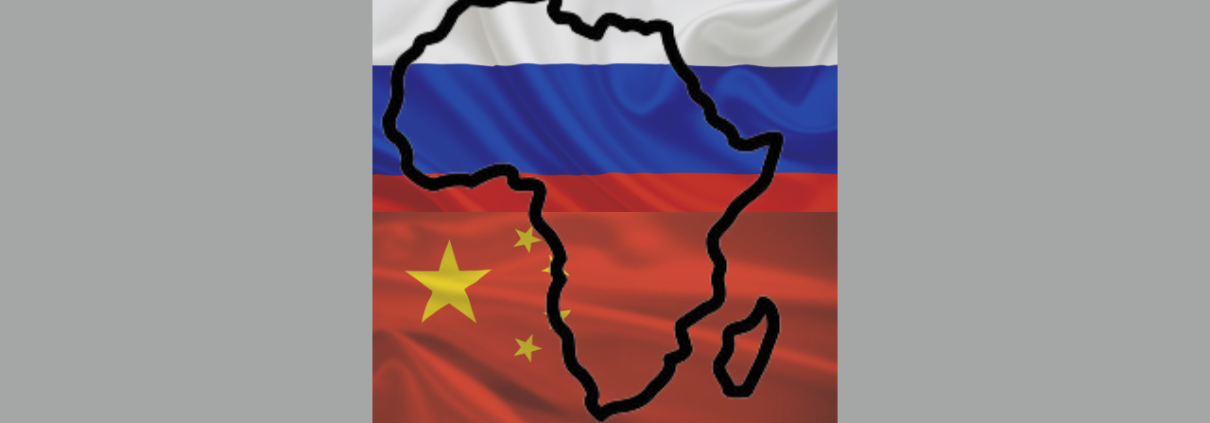Russian/Chinese Expansion in Africa
Making inroads in Africa
With last week’s state visit to Beijing by Equatorial Guinea’s President, which follows a separate visit by President Embalo (Guinea-Bissau) to Russia earlier in May (purportedly to prepare for an update to their 2018 military agreement), we analyse how international ‘powers’ are continuing to enhance their presence in the Gulf of Guinea.
Over the last 5 years, Russia and China have made significant strides in asserting their power in the region with China seeking to leverage its enhanced military reach to control strategic choke points crucial to global trade, and Russia attempting to restore its superpower status and influence Eastern and Central Europe.
Both nations clearly recognise the strategic importance of the Gulf of Guinea, which is not only rich in minerals and natural resources, but who’s coastline has over 20 major ports crucial for accessing new markets, however any action on their respective parts could well pose potential threats to regional peace and stability.
In the past 3 years, Russian and Chinese interests in Africa have grown significantly. China’s commercial activities have expanded quietly, highlighted by a newly commissioned pipeline transporting oil from southern Niger through Benin. Although the pipeline was briefly closed by the Porto Novo government (in response to accusations by the Nigerien government that Benin was allowing the presence of terrorist training camps on its side of the border), Chinese intervention resolved the issue, ensuring oil continued to flow through the port at Seme.
Both nations are keen to establish a naval presence to protect their strategic interests, following the historical precedent set by colonial powers. In April 2024, Russia signed a military accord with São Tomé and Príncipe for military training, logistical support and ‘possible collaborations’ raising concerns from Portugal amongst others about increased Russian influence.
As global powers vie for Africa’s vast resources, securing regional sea lanes is crucial. Tomorrow, we will analyse what has happened so far and what may be next for China and Russia in this strategic competition.In October 2021 the Russian Navy deployed a maritime task group to the Gulf of Guinea for counter-piracy operations, signalling its growing interest in the region. By July 2023, Equato-Guinean delegates at the Russo-Africa Summit in St Petersburg engaged with Russian oil, gas, and mining companies, aiming to enhance trade and economic ties. Following the summit, Russia announced it would reopen its embassy in Bioko.
In November 2023, President Putin met Equatorial Guinea’s President Teodoro Obiang Nguema Mbasogo in Moscow. Putin stated their discussions focused on security and regional relations, with plans for further collaboration. President Obiang highlighted the significant international security challenges and affirmed Russia as a traditional strategic partner of Equatorial Guinea and Africa.
Continuous Expansion
It is clear from this activity that Russia is intent on expanding its ties with Malabo, seeking a foothold for power projection into strategic regional waters. Whilst Russia’s navy continues to suffer losses in the Black Sea from Ukraine, Russia’s intent may well be to expand its footprint in the Gulf of Guinea to potentially interdict Western trade alongside securing its own interests in Africa.
President Obiang enjoys a close relationship with China, however Beijing has been far more measured in its ambitions than Russia, investing heavily in the port of Bata in Equatorial Guinea, ensuring its 550m piers are capable of accommodating the newest Chinese aircraft carriers (noting a recent Pentagon report in 2023 highlighted Equatorial Guinea as the potential site for a new Chinese naval base).
Notably, China has built a strong presence in the country for over 5 decades, with their activity being supported by a large embassy and robust security ties through bilateral engagements. Indeed, in a statement released during the recent state visit of President Obiang to Beijing, the 2 countries were said to have “elevated their relations to a comprehensive strategic partnership of cooperation”.
Since 2014, China has increased activities throughout the Gulf of Guinea, conducting port calls and anti-piracy drills with local navies (between 2014 and 2019 China participated in 39 military exchanges with regional partners). Again notably Angola and Nigeria are among China’s top oil suppliers and Lekki deep sea port was also built by a Chinese company. This growing engagement reflects Beijing’s strategic interest in the region, and their pursuit of a program of rapid naval expansion, both in terms of numbers and also capabilities.
In conclusion both Russia and China clearly see the Gulf of Guinea as vital ground with China particularly regarding the region as a link in its so-called “String of Pearls” – a strategic plan for a chain of naval bases around the world. These ambitions, if achieved by one or both countries, represent a significant challenge to western naval dominance of the eastern Atlantic and the entire West African coastline. While NATO is fixated on Ukraine, the Levant and Taiwan, both Moscow and Beijing are clearly keen on pushing forward with their strategies for Africa and wider global economic hegemony.


